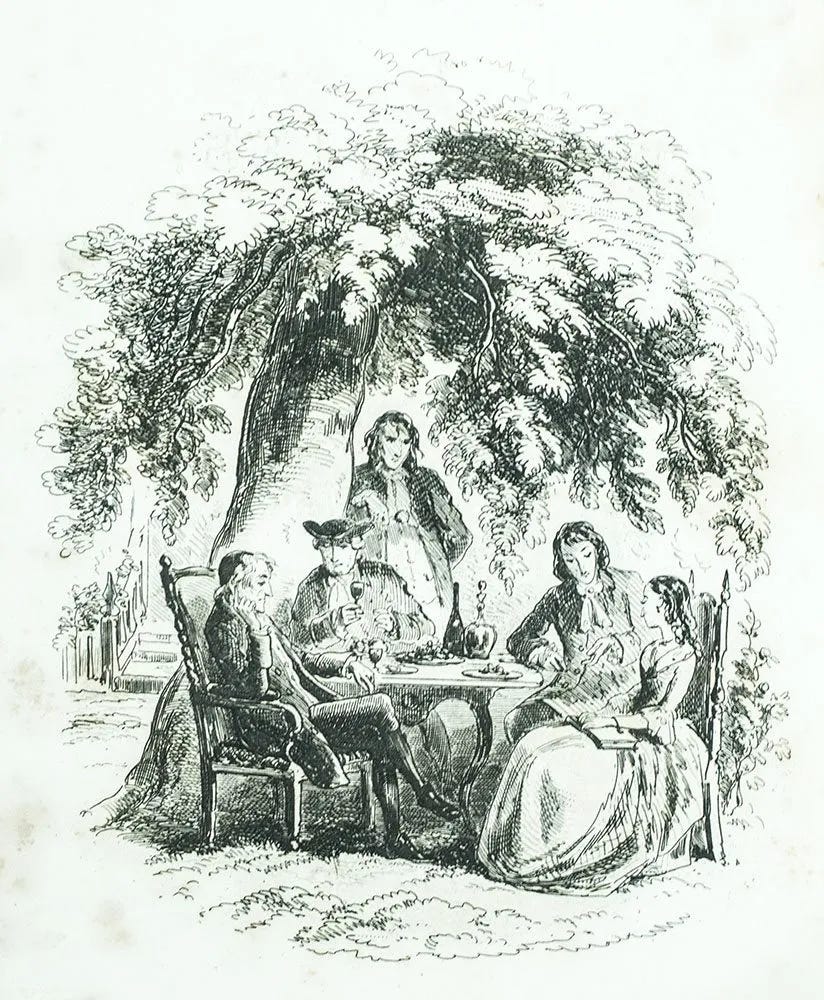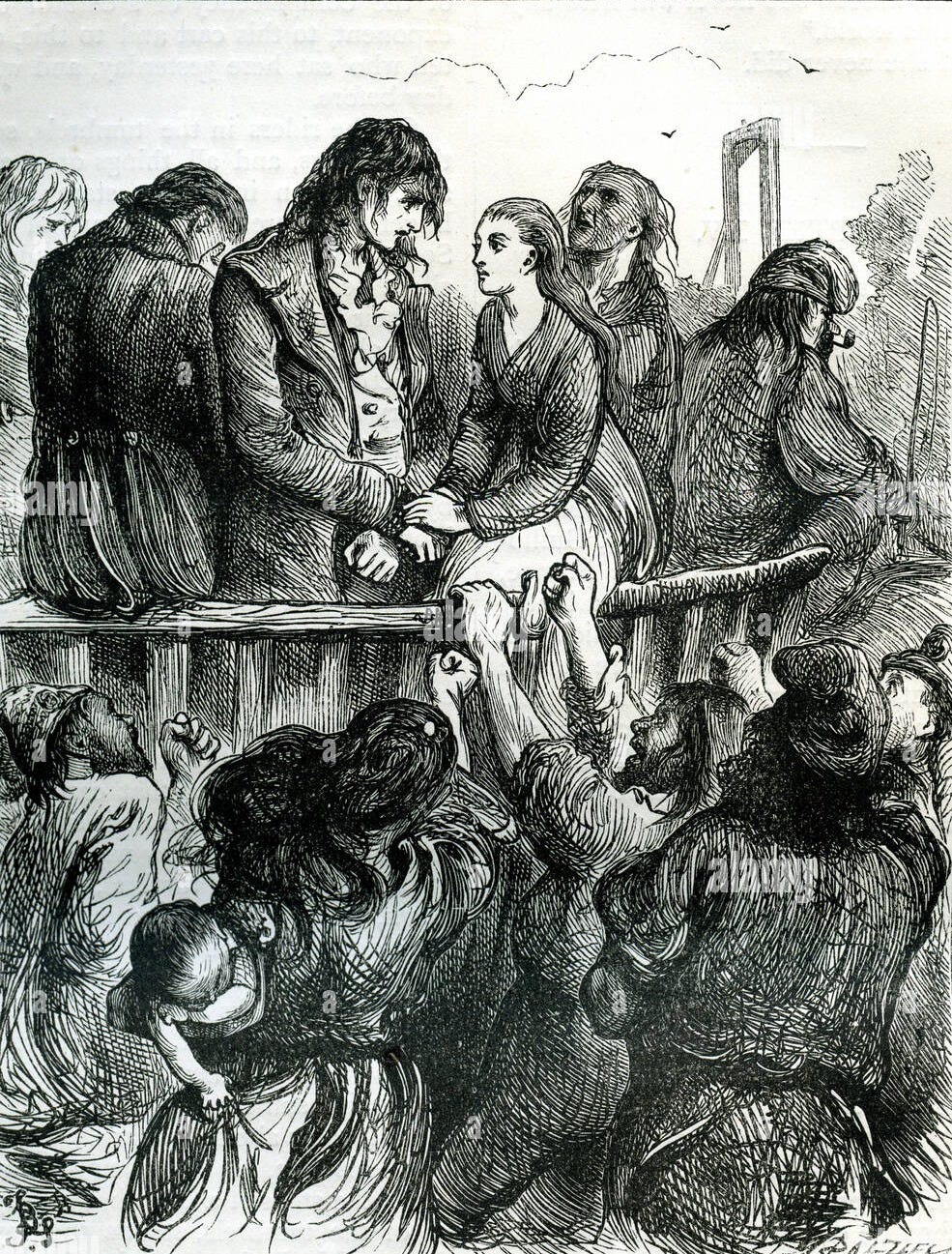
‘What wrong were you doing all day, Curdie? It is better to come to the point, you know,’ said the old lady, and her voice was gentler than ever before.
‘I was doing the wrong of never wanting or trying to be better. And now I see that I have been letting things go as they would for a long time. Whatever came into my head I did, and whatever didn’t come into my head I didn’t do. I never sent anything away, and never looked out for anything to come. I haven’t been attending to my mother—or my father either. And now I think of it, I have often seen them looking troubled, and I have never asked them what was the matter. And now I see, too, that I did not ask because I suspected it had something to do with me and my behavior, and didn’t want to hear the truth. And I know I have been grumbling at my work, and doing a hundred other things that are wrong.’
‘You have got it, Curdie,’ said the old lady, in a voice that sounded almost as if she had been crying. ‘When people don’t care to be better they must be doing everything wrong.’
-The Princess and Curdie by George MacDonald, 1883
Yesterday I was sitting in a lull at work, staring out the window deep in thought. People don’t tend to want coffee as much in the afternoon, and after all the cleaning and organizing is done, one is left with a lot of time to sit and think. As I stood there this particular day, thinking over the past several days and the last few weeks, I was hit by a sudden awful realization. One that made me heavy with regret and guilt.
I haven’t wanted to be better this week, I realized.
Don’t misunderstand me. I wasn’t being burdened by the wretched principle of “needing to make myself better”, an impossible attempt devoid of the gospel. I was regretting the fact that I hadn’t desired to grow. I hadn’t had any genuine desire to abide in Christ or to grow in His love. Like Curdie, whatever came into my head I did, and whatever didn’t come into my head I didn’t do. I never sent anything away and never looked for anything to come. I wasn’t attending to the people around me in the way I should have. I simply didn’t care.
And because of that, I was doing everything wrong.
“God,” I thought. “I’m sorry. Please, give me the desire to be better. Please.”
The Princess and Curdie by George MacDonald might be my favorite of MacDonald’s novels. The sequel to his famous classic The Princess and the Goblin, it may seem like an unremarkable old fantasy novel from the surface, but it’s the themes of the story that make it so profound.
MacDonald begins the story with Curdie, a boy who eventually realizes that he hasn’t been desiring to be better. If you’ve read The Princess and the Goblin you know that Curdie is a boy of remarkable bravery and character, so when we meet him in The Princess and Curdie, we find to our disappointment that he’s grown into the average young man. Moody, self-centered, and uncaring, it’s only when he commits the act of intentionally harming an innocent creature that he realizes what a wretched man he’s become.
It’s then that Curdie experiences a resurrection; a re-awakening from what was a dull, slow personal death.
MacDonald made this idea of personal resurrection the theme of the novel, later writing,
“There is this difference between the growth of some human beings and that of others: in one case it is a continuous dying, in the other a continuous resurrection.”
- George MacDonald
MacDonald isn’t referring to our physical death. Every moment we all grow closer to that day, regardless of who we are or what we believe. He’s talking about our spiritual selves; who we are on the inside. In other words, he is talking about the health of our souls. Are we continuously dying, or are we continuously resurrecting?
I was taking a walk with my Dad the other day and we were talking about this very idea of spiritual death and resurrection. He asked me how I had been doing with my anxiety. I told my Dad that I was doing much better. I was sleeping well and experiencing far less social anxiety, being much firmer in my faith and convictions.
“Well,” he said after I was done speaking. “Don’t let yourself fall into the idea that you don’t need to keep fighting against your anxiety. It’s during these times, when we’re doing much better than we were before, that we forget that we still need to seek to grow. Don’t let this make you lukewarm in your faith.”
“That’s true,” I said. “There’s no neutral place in life. If you aren’t constantly resurrecting, you’re dying.”
“Be killing sin, or it will be killing you.”
- John Owen, the Mortification of Sin
The Christian life is in no way passive. It is active in the most literal sense of the word. And yet, the “well, I’m pretty good” mentality is dominant in our culture. Sure, we may not think we’re doing amazing by any means. But we really aren’t that bad, are we?
It’s this mentality of mediocre goodness, of being “not all that bad” that rings the toll of our spiritual death. We Christians are especially notorious for this. We go to church on Sunday, tithe faithfully, help with the potluck and may even sign up to help with Sunday School; but in what ways are we looking to grow better? Are we asking God to give us the desire to grow, or are we satisfied with where we are? We shouldn’t be. If we are, we’re dying.
“The whole history of the Christian life is a series of resurrections…Every time we find our hearts troubled, that we are not rejoicing in God, a resurrection must follow; a resurrection out of the night of troubled thought into the gladness of truth.”
- George MacDonald
The quintessential illustration of Sydney Carton, this picture illustrates Carton leaning against a tree careworn and tired, looking on as the woman he loves is courted by a man who he knows is far more worthy of her.
‘There is nothing more to do,’ said he, glancing upward at the moon, ‘until to-morrow. I can’t sleep.’
It was not a reckless manner, the manner in which he said these words aloud under the fast-sailing clouds, nor was it more expressive of negligence than defiance. It was the settled manner of a tired man, who had wandered and struggled and got lost, but who at length struck into his road and saw its end.
Long ago, when he had been famous among his earliest competitors as a youth of great promise, he had followed his father to the grave. His mother had died, years before. These solemn words, which had been read at his father’s grave, arose in his mind as he went down the dark streets, among the heavy shadows, with the moon and the clouds sailing on high above him. “I am the resurrection and the life, saith the Lord: he that believeth in me, though he were dead, yet shall he live: and whosoever liveth and believeth in me, shall never die.”
In a city dominated by the axe, alone at night, with natural sorrow rising in him for the sixty-three who had been that day put to death, and for to-morrow’s victims then awaiting their doom in the prisons, and still of to-morrow’s and to-morrow’s, the chain of association that brought the words home, like a rusty old ship’s anchor from the deep, might have been easily found. He did not seek it, but repeated them and went on.
-A Tale of Two Cities by Charles Dickens, 1859
In the novel A Tale of Two Cities by Charles Dickens, Sydney Carton is a man characterized by failure. He drinks excessively, lives alone, and hates everything about himself. He told the woman he loved that to marry him would make her miserable, and he believes it wholeheartedly. He brings down the people he cares about. He scarcely knows how to even care anymore.
But in this scene of the novel, something is changing. Carton is wandering the filthy streets of Paris ridden with the death and despair brought by the French Revolution.
He watches the sunrise and remembers his mother’s death, the failures of his life, the hopelessness lying before him in France, and what comes to his mind is the verse from John 11:25:
Jesus said to her, “I am the resurrection and the life. The one who believes in me will live, even though they die; and whoever lives by believing in me will never die.
-John 11:25
Sydney Carton repeats these words to himself over and over again as he wanders through Paris. Little does he know that he’s preparing himself for a horrible physical death. And yet for the first time in a long time he’s been resurrected in the only way that, for we as humans, matters. He’s resurrected spiritually.
Sydney Carton preparing to die.
While the gospel requires the literal and physical resurrection of Jesus Christ, all that is required of us is a spiritual resurrection: that of faith in the gospel, acceptance of Christ, and repentance of sins.
I cry every time I read A Tale of Two Cities. I can vividly remember reading that scene for the first time, when the hopeless wretched man looks at his pathetic existence and finds the truth in an old near-forgotten verse. I cried, and when I reached the end of the book, I wept. Sydney Carton is all of us; he is the worst of us; he is the person who threw away talent and opportunity to live a life of meaninglessness. But will we, like Sydney Carton eventually does, remember and resurrect?
“It is the most counterintuitive aspect of Christianity, that we are declared right with God not once we begin to get our act together but once we collapse into honest acknowledgment that we never will.”
-Dane Ortlund, Gentle and Lowly
The Christian life is full of resurrection, first and foremost through the resurrection of Jesus Christ. But it is also full of smaller resurrections—personal ones. Resurrections that are only known by you and He Who made you.
There is no neutral zone in the walk of life. You’re either pulling ahead or falling behind, growing or wilting, dying or resurrecting. Being lukewarm isn’t being warm at all; it’s the process of growing cold.
When I took the leap, I had faith I would find a net; instead I learned I could fly.
-John Calvin
Today is Good Friday, the day where the man Jesus Christ was crucified on the cross, beaten and naked, mocked and laughed at by crowds. Today is perhaps the darkest day in human history. It’s the day where hope seemed to be dead, when the chance of redemption seemed nonexistent.
And yet…
We call it good. And it is good.
Today, will you resurrect? Tomorrow, will you resurrect? Day after day when the world pulls at you, when responsibility weighs at you, will you come back and return to the love you had at first? Will you let Jesus Christ bring you back again, and again, and again, and again?
May Christ to give us all the desire to be better; else we will do everything wrong.
“The birth, death, and resurrection of Jesus means that one day everything sad will come untrue.”
- J. R. R. Tolkien





This is so good Emma. I have been struggling with this, feeling like I am just "dying," not wanting to grow or do better...and the most disturbing part is that I haven't really been caring either way.
What I need is to be personally and constantly resurrected :)
This is tough stuff and you hit the nail right on the head.
Thank you for this piece. It is well written and points to the only one who can save us, our healer Jesus Christ. I have been feeling burdened and at a spiritual low for this past week. Your words reminded me that I need to turn to God to pull me up, and not to my own weak self. Keep writing! May God bless you and keep you :)